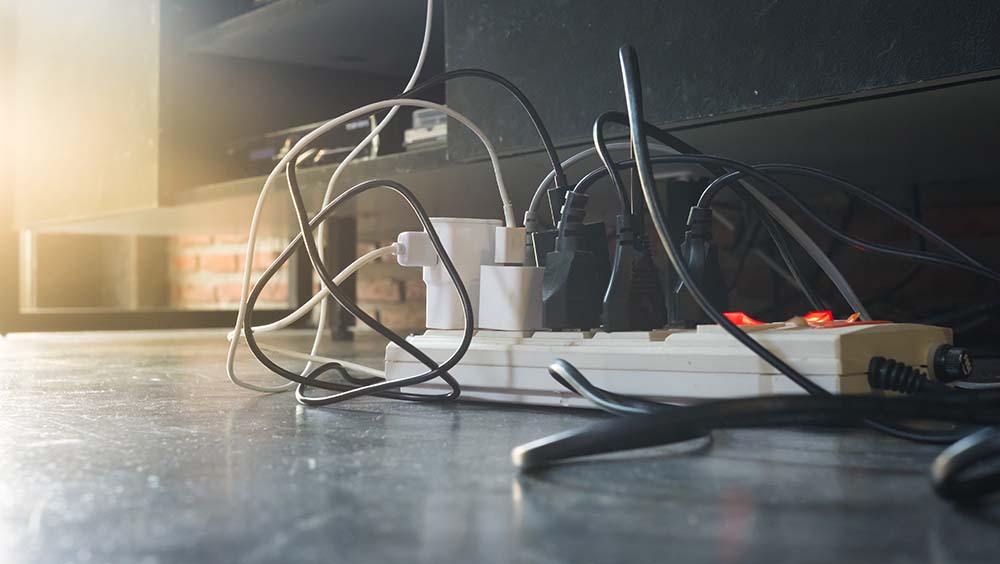An electrician from MyBuilder.com is warning people to be extra cautious with electrical devices this holiday season, fearing that a lack of electrical knowledge is what makes December the danger month for house fires in the UK.
While it can be a time for over indulgence, Christmas should come with an electrical health warning, say experts, due to the dramatic increase in appliances being used in our homes.
Extension cables left coiled up and overloaded sockets and adapters can also dramatically increase the risk of fires. The extra sockets used for Christmas lights and decorations, plus extra guests needing to plug in appliances can increase the chances of an electrical fire.
Another risk is the use of cheap Christmas lights and other electrical goods that fail to meet UK safety regulations.
Every year more than 7,000 house fires in the UK are caused by faulty electrics, appliances, wiring and overloaded sockets. Data shows that December is the month that sees the most house fires caused by electrical issues.
Electrician Jonathan Steed, who has a five star rating and more than 1000 reviews on MyBuilder.com, said: “Christmas is a lovely time of year, but we need to be mindful of the risks. It’s important to take precautions around electrics – get it wrong and you’re facing broken appliances, shorted electric circuits, and potentially fires.
“For example, connecting multiple extension cords together can cause a build-up of heat which can become a fire hazard. This also creates higher resistance within the cables and increases the risk of equipment getting damaged. If too many appliances are plugged into the socket, the breaker will trip due to overloading in the circuit.”
“There’s no need for the festive period to pose a risk to any of us as long as we are sensible about what we do and closely follow safety recommendations. The pennies you can save by cutting corners or compromising on quality aren’t worth the risk to your property or yourself – and if you mess around with electricity you are literally playing with fire.”
Expert electrician Jonathan Steed of MyBuilder.com advice for a safe Christmas:
AVOID overloading your sockets
Whilst it is always best to keep to one plug per socket, the extra requirement of Christmas can make this impossible. Avoid block adaptors and choose a multi-socket extension lead with integral fuse. To avoid overloading, use a plug capacity calculator to see what is safe. There are many online calculators that will allow you to work out what your sockets can cope with.
AVOID leaving extension leads coiled when in use
While a multi-socket extension lead is your safest option, there are certain steps you should take to ensure safe usage of any extension lead. NEVER ‘daisy-chain’ extension leads or adapters – daisy-chaining involves plugging one extension into another in order to reach further or plug more appliances in, and creates a fire risk. It’s also vital to check if there are any appliances/items that should not be plugged into an extension cord. For example, large appliances such as refrigerators and washing machines should never be plugged into an extension lead. Neither should temperature-controlling devices such as heaters, and perhaps surprisingly, hair styling devices.
AVOID using indoor sockets for outdoor lights
You should only plug your outdoor Christmas lights into appropriate outdoor sockets. For outdoor electrical sockets, an IP rating of at least IP44 is recommended, with higher ratings like IP66 or IP67 providing even greater protection. It must be installed by a qualified installer, because it is illegal to install outdoor electrical sockets yourself.
AVOID cheap, unregulated lights and appliances
Many Christmas lights, phone chargers, and other cheap cables purchased online do not meet UK safety standards. These can give nasty electric shocks and lead to fires. Make sure any electrical appliance has a British or European safety mark when you buy it. Jonathan recommends purchasing the best quality LED Christmas lights that have full rubber cabling and at least IP44 rating for indoor lighting.
CHECK for damaged cables
Before you plug in any lights or electrical decorations, check them for damage. Many decorations are stored outside in a shed or garage, and can be subject to rodent damage or water ingress.
NEVER mix water and electrics
Always keep plugs and electrical items away from water. For any exterior decorations, check the requirements for safe usage carefully. Often, despite Christmas lights being suitable for outside use, the plug adapter can be too big to fit in a weatherproof electric box which leaves it exposed to rain and moisture.
AVOID leaving your lights on at night or when you’re out
While you might enjoy seeing your lights on 24/7, they can overheat if left on constantly. It’s safer (and cheaper!) to select a time for your lights to go on and off. It’s always a good idea to switch off when you go to bed, or when you leave your home. Jonathan recommends purchasing the best quality LED Christmas lights that have full rubber cabling and at least IP44 rating for indoor lighting.

